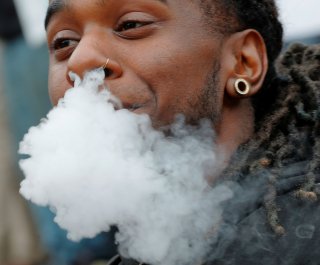New Study Shows Teen Vapers 5 to 7 Times More Likely to Get Coronavirus
Vaping doesn't help your health at all.
There’s yet another public health crisis at stake in America: the “epidemic” of teen and young adult vaping.
A new study conducted by the Stanford University School of Medicine revealed that among young people who tested positive for the coronavirus, those who engage in vaping or e-cigarettes are five to seven times more likely to contract the deadly virus.
“We were surprised,” Dr. Bonnie Halpern-Felsher, professor of pediatrics at Stanford University and the study’s senior author, told NBC News. “We expected to maybe see some relationship .... but certainly not at the odds ratios and the significance that we're seeing it here.”
The study observed over 4,351 participants from ages 13 to 24 and marks the first national population-based look at links between vaping and coronavirus among young people.
Last year, more than five million students—both in middle school and high school—actively used e-cigarettes, with little knowledge of the long-term effects it could do to the body.
“This is yet another piece showing that e-cigarettes are harmful to our health, period,” Halpern-Felsher said.
Although it’s still unknown what the connection is between vaping and getting the coronavirus, public health experts and survey researchers have some speculations. One reason for the boosted risk is the damage that e-cigarettes can do to lungs. Using e-cigarettes not only worsens the strength of the lung, but also weakens a body’s immune system and therefore spikes the risk of contracting any serious infection.
Others hypothesize that if someone already has the virus, the aerosol emitted from their e-cigarettes could potentially have droplets that have the virus, which could spread to surrounding people if inhaled. Vaping has also become a social norm—especially among young people—as students share and pass e-cigarettes to one another.
“Using e-cigs is sort of like the anti-mask,” Dr. Jonathan Winickoff, professor of pediatrics at Harvard Medical School and MassGeneral Hospital for Children told NBC News. “If we can control vaping in youth, we’ve gone part of the way in helping curb the pandemic.”
Representative Raja Krishnamoorthi (D-Illinois), chairman of the House Oversight and Reform Committee’s Subcommittee on Economic and Consumer Policy, wrote to the Food and Drug Administration (FDA) Tuesday, referring to the Stanford study. Krishnamoorthi’s goal was to pressure the FDA to ban e-cigarette sales for the rest of the coronavirus pandemic.
Krishnamoorthi has already written to the FDA back in April when he discovered other studies examining the relationship between vaping and contracting the coronavirus.
In his most recent letter, Krishnamoorthi provided them a week to respond to the request.
“The science is now in: e-cigarette users are much likelier to be diagnosed with COVID-19 and to experience symptoms,” Krishnamoorthi wrote. “While we are not writing today to address the safety of e-cigarettes for adult smokers following the deadly spread of COVID-19, it is evident that the youth vaping epidemic has combined forces with the Coronavirus pandemic, creating a much deadlier foe that demands FDA action.”
Rachel Bucchino is a reporter at the National Interest. Her work has appeared in The Washington Post, U.S. News & World Report and The Hill.
Image: Reuters

